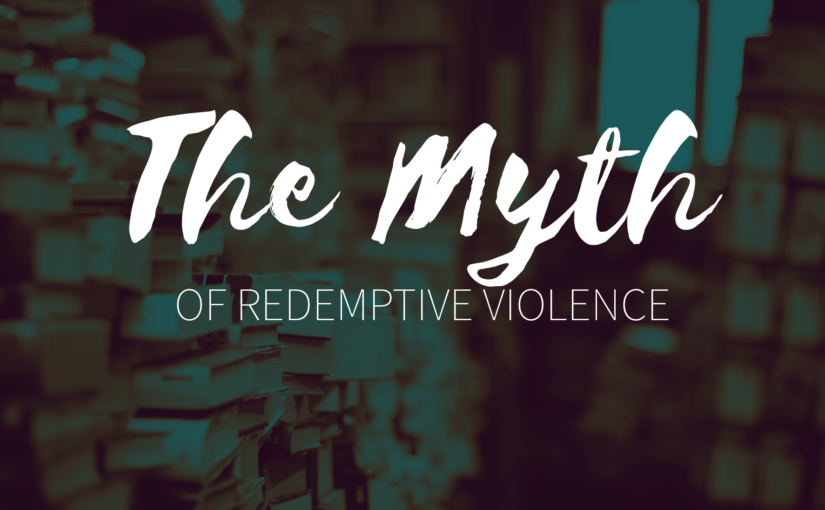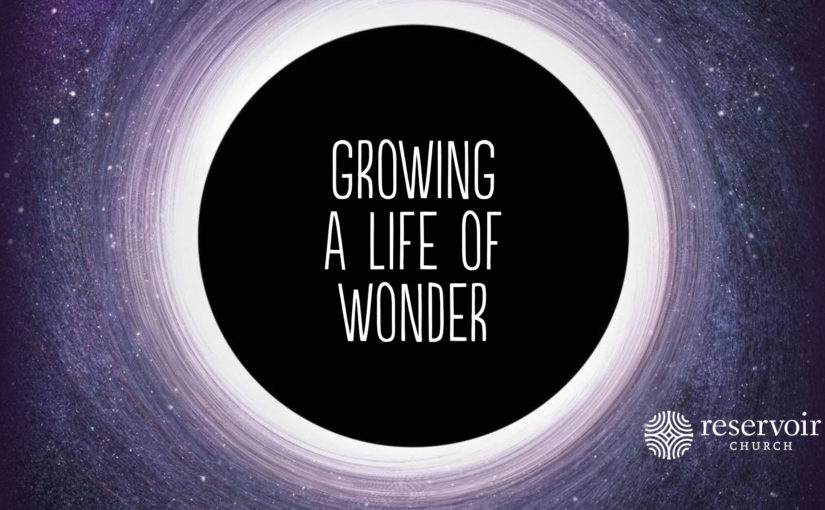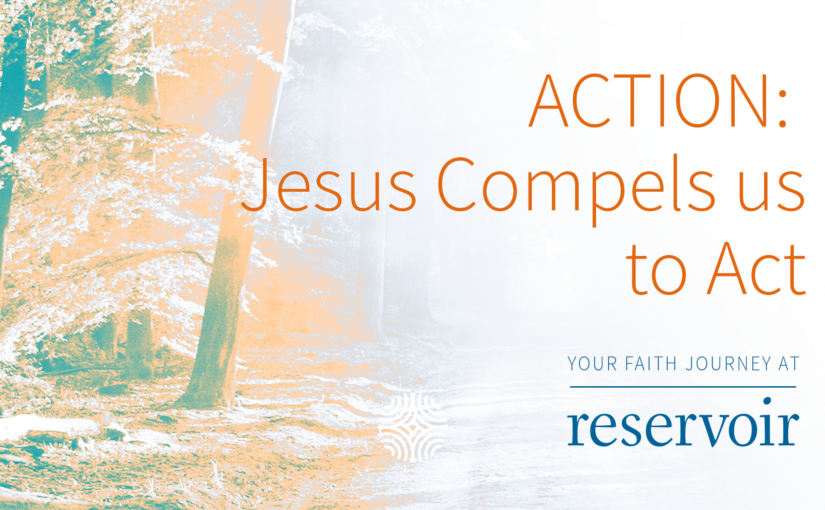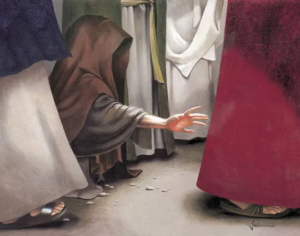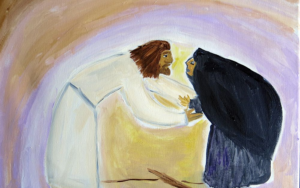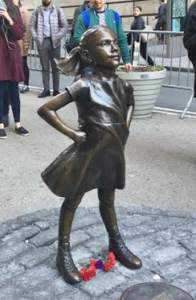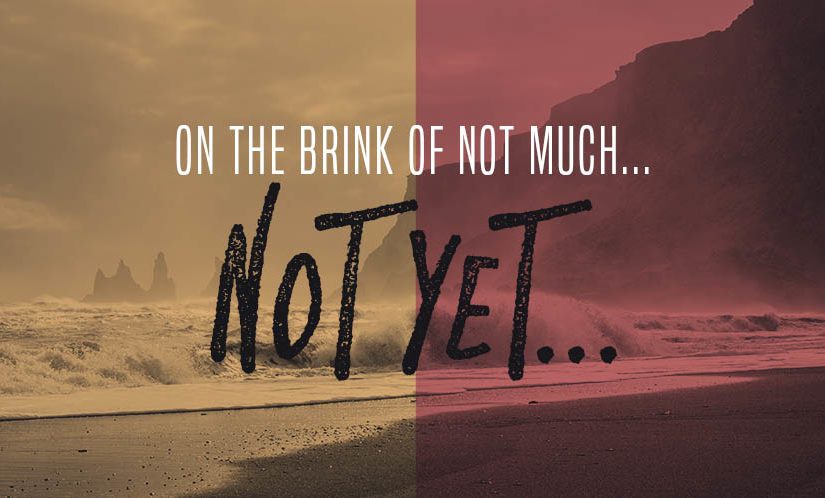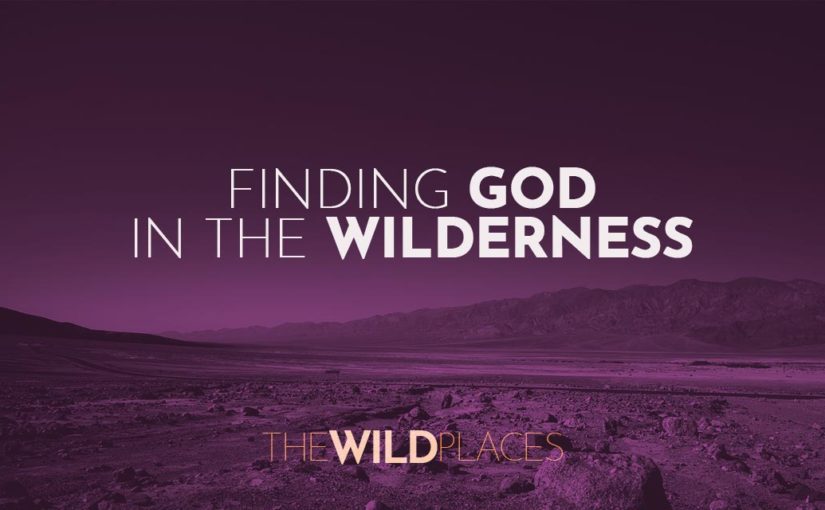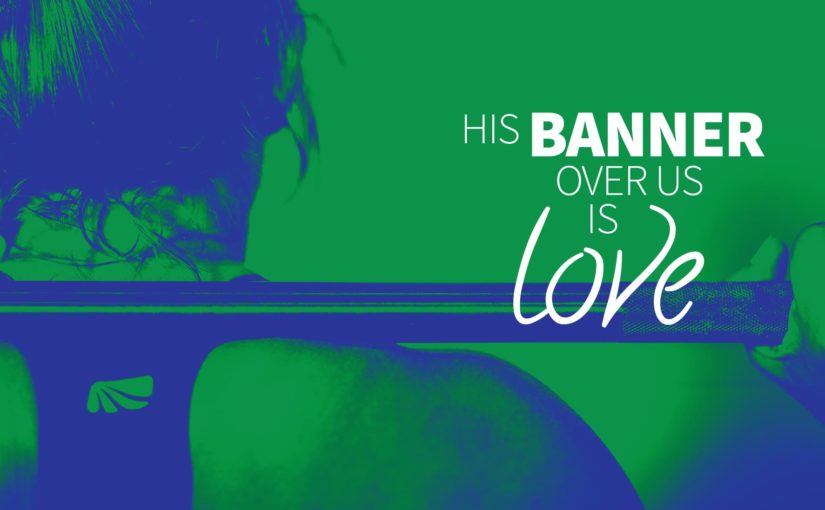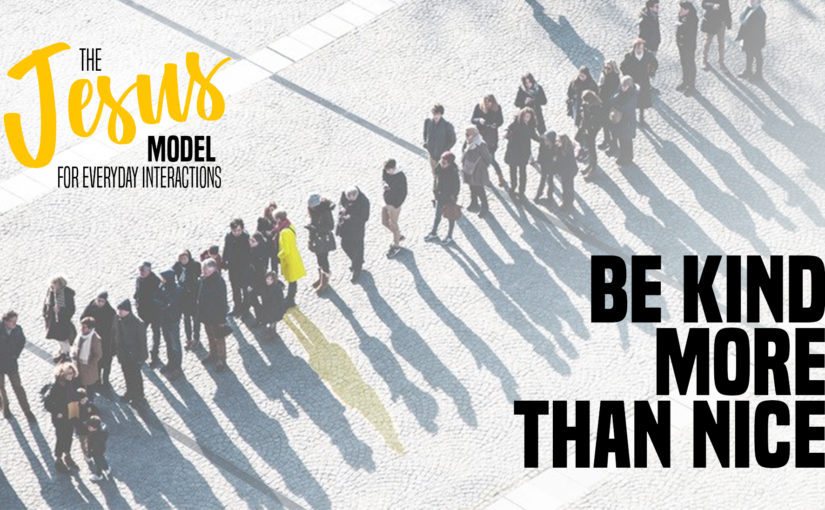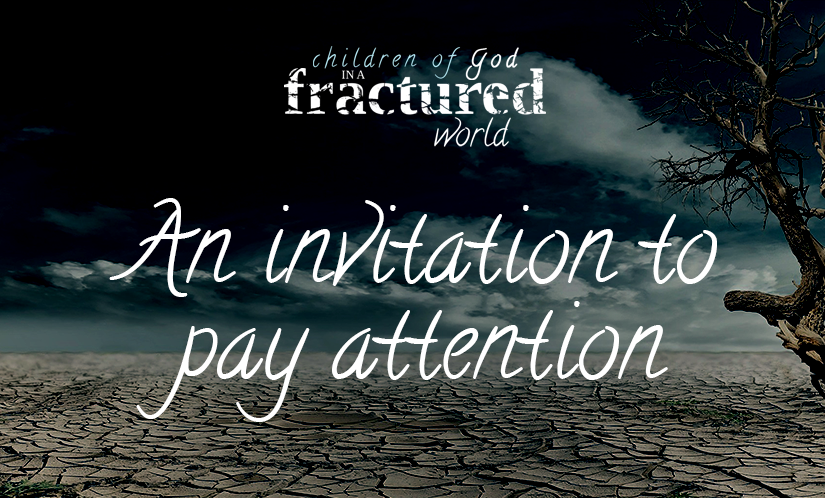Second in the Series, Seven Stories: Jesus’ Big Story, and the Other Stories by Which We Live
Hey, Friends, spoiler alerts for today’s talk. I’ll be giving away bits from the latest Star Wars film, from a cool bit of storytelling on a New York Times podcast, and the fate of our nation and pretty much everything and everyone else that is built upon violence. So, if you don’t want to hear those things, just close your ears when the time comes.
Last fall, The New York Times released a fascinating bit of journalism from their bureau in North India. It was called The Jungle Prince of Delhi. It tells the story of Begum Wilayat Mahal, who first came to the public’s attention in the 1970s when she, her two children and a pack of dogs took up residence in a Delhi railway station, refusing to leave, because – she said – she was the last princess of the kingdom of Avadh, a branch of the ancient Muslim Mughal empire that ruled over much of Central and South Asia for centuries, building the Taj Mahal and many other wonders.
She said her family was never compensated for their losses, dating back to the British Empire, and they weren’t moving until they were given a palace. This being India, they were allowed to remain on this platform for years. Some local governments were embarrassed, tried offering them a small home and other bits of compensation, which were refused. She deserved a palace. And so eventually, a suitable one was found and given. It was the ruins of a 14th century summer palace, in the jungle outside of Delhi.
The princess and her family accepted and moved in. There they remained for decades, largely shut off from the outside world.
It turns out the family had lived this strange mix of opulence and squalor. They possessed ancient royal ruins, with an extraordinary rooftop view of New Delhi. In other circumstances, their palace may have been restored as a museum or luxury hotel.
And yet, the palace was in ruins. No electricity, no water, mostly cut off from the outside, the family lived in poverty and isolation and eventually died one by one, alone.
And now, the spoiler. Their original claim to royalty isn’t even true. They had a very real grievance, but it was not theirs alone.
The princess wasn’t a princess. She was one of millions of Muslims of North India who fled to Pakistan after the partition of those two countries in 1947. Like tens of millions of Hindus and Muslims, she and her family were exposed to violence and trauma during one of the modern era’s great episodes of forced migration and religious-based violence. It’s a trauma of religion, and a trauma of post-colonial oppression that haunts the region still.
In the case of this particular family, when the mother returned to India and sought to retrieve her family home and land, she could get no compensation, no justice. When she sought these things, with increased agitation, she was committed to a psychiatric hospital, where she was essentially tortured. Upon release, she either invented the royal heritage to finally get her recompense, or perhaps, after years of trauma and abuse, she had come to believe her own fantasy of grievance.
The enormous unhealed trauma she endured, and her odd quest for justice, estranged her from one child, who moved to the UK and kept his own traumatic origins a secret nearly til his death. And it led to her other two children each living lonely, empoverished, traumatized lives of their own, until they too died penniless and alone.
The Jungle Prince of Delhi turns out to be a multi-layered tragedy. It’s a story about the legacy of a lost ancient kingdom. It’s a story about unhealed family trauma. It’s a story about the great South Asian partition, and all the religious violence that has plagued our world for centuries, even millenia. It’s a story about the enormous ripples of suffering created by colonial domination and valiant but usually failed efforts to seek justice and recompense. And it’s the story of unhealed grievances, of the pains of being formed by violence and domination, even if we’re not the ones who started it at all.
All of this connects to our sermon today, which I’ve called The Myth of Redemptive Violence. It’s the second of six weeks we’re spending telling the story of Jesus from the gospel of Luke and contrasting that story with six other, more common stories that we have been telling, and listening to, and following for far too long.
This series was inspired by a children’s book by Gareth Higgins and Brian McLaren, which I read last week. It’s called Cory and the Seventh Story. In it, we meet a badger who tries to create a “happily ever after ” story for himself by stealing what he wants from the fox and intimidating everybody else, making sure he can always get his way. That’s the story of domination, us dominating, of being the boss of others. Next, the fox gathers some friends to take the badger down, get back what’s his, and try to make things right in the world through violence. That’s the story of revolution, of us overthrowing them, getting revenge on those who bossed you around.
Either way, all this violence doesn’t lead to the flourishing Jesus longs for in our lives, a life without us or them, just us. A life that isn’t defined by anyone’s violence or domination, our own or someone else’s.
There’s a moment in Luke when we get a window into Jesus’ pain over violence, be it the violence of domination or that of revolution. It’s in the 19th chapter of Luke, when Jesus is on his way into the city of Jerusalem, and looks out over it in this moment of clarity and deep sadness.
Luke 19:41-44 (CEB)
41 As Jesus came to the city and observed it, he wept over it. 42 He said, “If only you knew on this of all days the things that lead to peace. But now they are hidden from your eyes. 43 The time will come when your enemies will build fortifications around you, encircle you, and attack you from all sides. 44 They will crush you completely, you and the people within you. They won’t leave one stone on top of another within you, because you didn’t recognize the time of your gracious visit from God.”
Jesus looks out over his beloved city of Jerusalem, the center of his culture’s religion and economy and culture, and he pictures all that being destroyed, and asks: Why? It shouldn’t have to end this way.
See, Jerusalem then was occupied territory, as it has so often been. Rome had brutally colonized Judea and all the surrounding regions, and during Jesus’ lifetime, there was a growing swell of rage, grievance, and resistance. There was a movement that was tired of the oppression. Tired of all the taxation. Tired of the state violence, and terror, and intimidation. Tired of the humiliation.
Three or four decades after the vision Jesus has, this movement would surge into a revolt that would briefly force Rome out. Until Rome returned with patience and might and laid siege to the city. It was a time of horrific poverty, starvation, and violence that ended with Rome crushing Jerusalem, scattering many of its residents, and destroying the temple – ending ancient Judaism, in one of that people’s many great cataclysms.
Luke records Jesus looking out over Jerusalem and seeing all that coming. And thinking I had a way of peace for you. Why didn’t you listen?
Obviously, Jesus isn’t blaming his people for their coming annihilation. That’s on Rome. They were the colonizers, the dominators, the powerful people who again and again took what wasn’t theirs. Who tried to secure their own happily ever after, at the costs of others’ suffering. Us over them.
But Jesus laments, thinking still, there were other options. Jesus had a way of peace that was better than giving up in resignation, or returning violence in a failed attempt to redress their grievances. Us overthrowing them.
At least this time, Jesus thinks: they’re going to miss it. So sad.
We’ll talk in a minute about Jesus’ way of peace, that we’ve seen far too little of over the years.
But it’s one that in many ways, the churches of the first couple of centuries appeared to embrace – not living by the norms and stories of their time, but not violently resisting either. They formed and grew counter-cultural communities of radical love, radical hospitality, radical service, radical inclusion. It may well be the greatest reason for the rapid growth of the Jesus movement in its first couple centuries.
But think with me for a moment: If Jesus and his early followers, way back two millennia ago, had a problem with violence, what does that say to residents of a country that itself was a product of violent revolution?
How is the Myth of Redemptive Violence one of our favorite stories in America, and what is it doing to us?
This phrase the myth of redemptive violence is something that many scholars have been exploring in our lifetimes. They’ve noticed that a lot of societies have very violent stories of how things came to be the way they are today. Stories where the world has always been in chaotic violence. Stories where more violence brought order or peace to the world. Stories where heroes were people who won their victories and accomplished good through yet more violence.
Societies have long been telling this story, this myth. But it’s not just an old story. Hello, America! This country has has grabbed hold of the Myth of Redemptive Violence like maybe no other people, ever.
We’re a country born first of violent domination. Colonizers claimed this land by trickery and treaty violations and genocidal war. Colonizers enriched this land through the largest, most brutal, most racist slave trade industry in human history. The legacy of all this unhealed violence of domination haunts us still.
Not only that, but our country is the product of violent revolution as well – a story we celebrate again and again.
We’re addicted now to this violence.
Our films, year after year, celebrate redemptive violence. Good people are done wrong, and they heal their grievances through violent revenge. Their violence restores order and justice to the world and makes them heroes. It’s the plot of most of our heroic films.
Our most popular, lucrative sport is one of incessant, bone-crushing violence, that seems to shorten its participants length and quality of life.
We own guns at rates of no other peacetime country because we view the right to that potential for violence as sacred to us, essential to our security.
And in our lifetimes, America has seen few problems in the world we think we can’t bomb our way out of. Hurt us, cause us grief at all, and we will break you.
Here’s the thing. The idea that any of this violence is redemptive is foolishness. Redemptive violence isn’t just a myth because it’s an old story, it’s a myth in that it’s a lying story.
I don’t have anything to say about all our violent entertainment – going off against that isn’t really my jam. But on the guns front, we kill each other and especially kill ourselves in this country at rates that look obscene compared to most of the world. Our guns aren’t making us secure.
And look at any region in the world that seems angry, unstable, dangerous, a potential breeding ground for terror or war or mass refugees, and you’ll usually see a history of American arms dealing and American violent aggression as part of the back story.
Our collective addiction to violence, our buying in to the myth of its redemptive possibilities is helping us dominate and redress our grievances in the short run, but it’s stirring up more and more trouble in the long run.
OK, all this is very macro. But I’ve been thinking about the myth of redemptive violence, and the story of revolution – us overthrowing them – on a personal, relational level too. This used to be more obvious, some places still is.
But I trust that no one is planning on taking up arms against their enemy tomorrow, or challenging someone to a duel. We’re good there, right?
I was talking with a few friends recently about where we see this story of us overthrowing them in our relational lives these days. And we all agreed that we knew people that use words to attack people that have hurt us. We know what incessant criticism sounds like. We know what bitterness sounds like.
But we all agreed that what we’ve most experience from people when we’ve hurt them, or what we’ve done most to people that have hurt us, is we cut people off. We shut people out. We call them out, or just cancel them.
I remember the first person I heard articulate this as a life strategy. When I was first living on my own, I had a roommate who was awful to me. He insulted me, was rude to me in all kinds of ways and then when I tried to talk with him about it, he said: Listen, I don’t ever want to talk to you again. As far as I’m concerned, I don’t know you. You don’t know me. We will not speak again until you move out.
And stubborn guy that I am, I was like: well, if those are your rules, why don’t you move out? And eventually, he did. Fair enough. I’d tried my best, but there was nothing more I could do.
But, given this experience, when I was talking to another friend about moving in, I told him what had happened. And I asked him: I don’t expect we’ll have that kind of conflict, but what happens if we do have some unforeseen conflict? What would you do?
And he’s like: well, here’s how it works with me. I trust my friends. I’m loyal. I do the right thing. And I’m not easy to offend. But if someone hurts me once, if someone breaks my trust, then I will never trust them again. I cut them out. It’s over.
And, given what I just experienced, that concerned me a little, and I was like, doesn’t that pretty much guarantee that you’ll never stay connected to anyone. Cause we all hurt people eventually, even people we care about, right? But you seem kind of anti-second chances. And he was like: well, sorry, that’s the way I am.
Shockingly, we didn’t stay friends for very long. Eventually, he cut me off for something, I can’t remember what, to be honest.
Have you seen this in your life? Have people cut you off, cancelled you before? Have you done that to somebody else?
I was thinking the other day about some of the people that I feel have done me wrong, some of the people I think I’ve done wrong too. And it was surprising and sad to me to remember how many of these relationships ended by one of us essentially ghosting the other.
Not ending the connection for our own safety or protection. There’s obviously a time and place for that. I’m not talking about that. I’m talking about times when we’re offended or hurt, and we don’t try to do the same hurt back per se. Maybe we can’t. But we just move on as quickly as possible.
As a pastor, I see people do that with their church sometimes. Offended by something or other, caught up in a tricky relational dynamic, and just washing their hands and moving on.
Maybe this doesn’t do the harm in the world that violent retribution does, but it doesn’t mend or heal either. It doesn’t make us whole.
As I’ve said, I think Jesus has a better way.
Listen:
Luke 6:27-31 (CEB)
27 “But I say to you who are willing to hear: Love your enemies. Do good to those who hate you. 28 Bless those who curse you. Pray for those who mistreat you. 29 If someone slaps you on the cheek, offer the other one as well. If someone takes your coat, don’t withhold your shirt either. 30 Give to everyone who asks and don’t demand your things back from those who take them. 31 Treat people in the same way that you want them to treat you.
This is maybe the most distinctive teaching of Jesus. Love of enemies is a hallmark of what it means to follow Jesus. Sadly, though, many people have heard this and assumed that Jesus taught resignation, defeatism, just roll over and suck up every awful thing that anyone ever says or does. Be nice, while being a victim.
What Jesus is saying, though, is so much more powerful, so much more original than that.
A couple years back, Pastor Ivy taught this passage. And she taught the perspective that theologian Henry Thoreau and Mahatma Ghandhi and Walter Wink, and Martin Luther King, Jr. saw in this passage. That Jesus taught the disruption of violence through loving, non-violent resistance. Provocation that breaks the cycle of violence, and begins a cycle of healing and flourishing.
Roman soldiers slapped Jews, to humiliate them. To punch with a fist was only for fighting your social equals. And they only used their right hand, as their left was for wiping their rear – and it was socially unacceptable to do stuff with your left hand. So to turn your cheek after being slapped is to force the Roman to treat you as an equal or to humiliate them by making them slap you with their left hand. Weird, but true, I swear. When Ivy taught this, she and her son Reed acted it all out – it was great. Plus, as they showed, to stand as Jesus says to is actually a strong gesture, not a weak gesture. Try to fight back with a Roman – and they’re a solider. They will win. And you will end up in jail or dead. But to not cower in defeat, but to look them in the eye, stand erect, and dare them with your other cheek. That is strength.
That’s what’s going on in all this teaching. Jesus teaches love of enemies by not returning violence, but also not accepting it as the final word.
The Jesus story, the story of love is not to ask: how do I get back or get even? How do I win? That’s the toxic story of revolution. This obsession with grievances, and redressing them. The story of love is also not to ask: how have I lost again? There’s nothing I can do.
No, the story of love, the Jesus story is to ask: how do I provoke a different dynamic here? How do I stay engaged, but on different terms than the aggressor has set up? When me or mine are done wrong, what power do I have to begin a cycle of healing and justice?
We see this super-powerfully in the latest, the final Star Wars film. And again, double apologies here. If you haven’t seen it still and care, I’m going to give something away. It’s been out a while, so I think I have the right. And if you’re a Star Wars devotee, I’m probably going to say everything wrong, as I’m more of a casual viewer. So sorry to you too.
But in this story, Rey is the last Jedi. She’s like the last great hope for goodness and light in the Universe. And her great foil turns out not to be the prince of darkness Kylo Ren, but the old, old evil Emperor, who’s existing in this undead, zombie-like existence, still fueling, empowering all the evil in the universe.
And when Rey comes face to face with the Emperor, what he wants most is for Rey to hate him, to murder him, to return him violence and kill him. Because if she does that, she will in a sense become him. His spirit, his life force, his evil will then live on through her, the new emperor.
But what Rey does in this film that is so stunning is that each time she is confronted by evil, she seeks to offer healing. She looks at her enemy and says: what can I do to make him whole? And when with the Emperor, she sees no way to make him whole, what she does is she doesn’t hate the Emperor and doesn’t return him violence. She simply protects herself. She refuses to listen to him or be harmed by his evil. And by not receiving the force of his violence, it turns back on himself, and he self-destructs.
This is of course exactly what we celebrate tomorrow on Martin Luther King, Jr. Day. We celebrate one man, and not just one man, but a whole movement of women and men, who stared down the great evils of racial injustice in our society and said: this evil will not define me. I will not accept or receive it. We will turn it against itself.
And throughout the 50s and 60s, America watched as the Civil Rights Movement exposed America’s violent racism with provocative, non-violent love. When King was assassinated in the late 60s, he was of course just getting going, turning his attention to the violence of American militarism, the violence of Northern America’s segregation, and classism, and racism.
Much work remains for us still.
But King gave us one of our time’s clearest, most compelling pictures of how the story of Jesus exposes the myth of redemptive violence, disrupts our stories of domination and revolution, and opens possibilities for healing and flourishing.
I wonder what would have happened in Delhi if Begum Wilayat Mahal had stood on that railway platform with her dogs and her family, not insisting she be given a palace, but insisting that all the victims of the partition be made whole. What if she had held a sign that said: I am the partition. And another that said: We are still here. And another that said: Make South Asia whole again. I have no idea. In that case, one can only dream.
But we can do more. When we’ve been done wrong, and when the people we are sympathetic to have been done wrong, when we have grievances, we can keep being defined by the violent, we can obsess over winning and vindication and how to take them out or take them down. We can ghost those who hurt us too, cut them off, cancel them, and pretend we don’t bear loss or hurt.
Or we can engage with provocative, non-violent love. I’d love to invite us to try. So we’ll take a couple minutes on our invitations today, if that’s alright.
Invitations to Whole Life Flourishing
How are you defined by domination and violence, even if it’s your reaction to someone else’s? Where is US/THEM strong in you?
What would it mean to embrace Jesus’ vision of restorative, healing justice that starts to undo being defined by US vs/ THEM?
Spiritual Practice of the Week
When you think of someone you resent, break the cycle of grievance and violence:
- name the harm this person is attached to,
- remember this person is not higher or lower than you,
- release your attachment to them. “This person does not get to write my story.”


